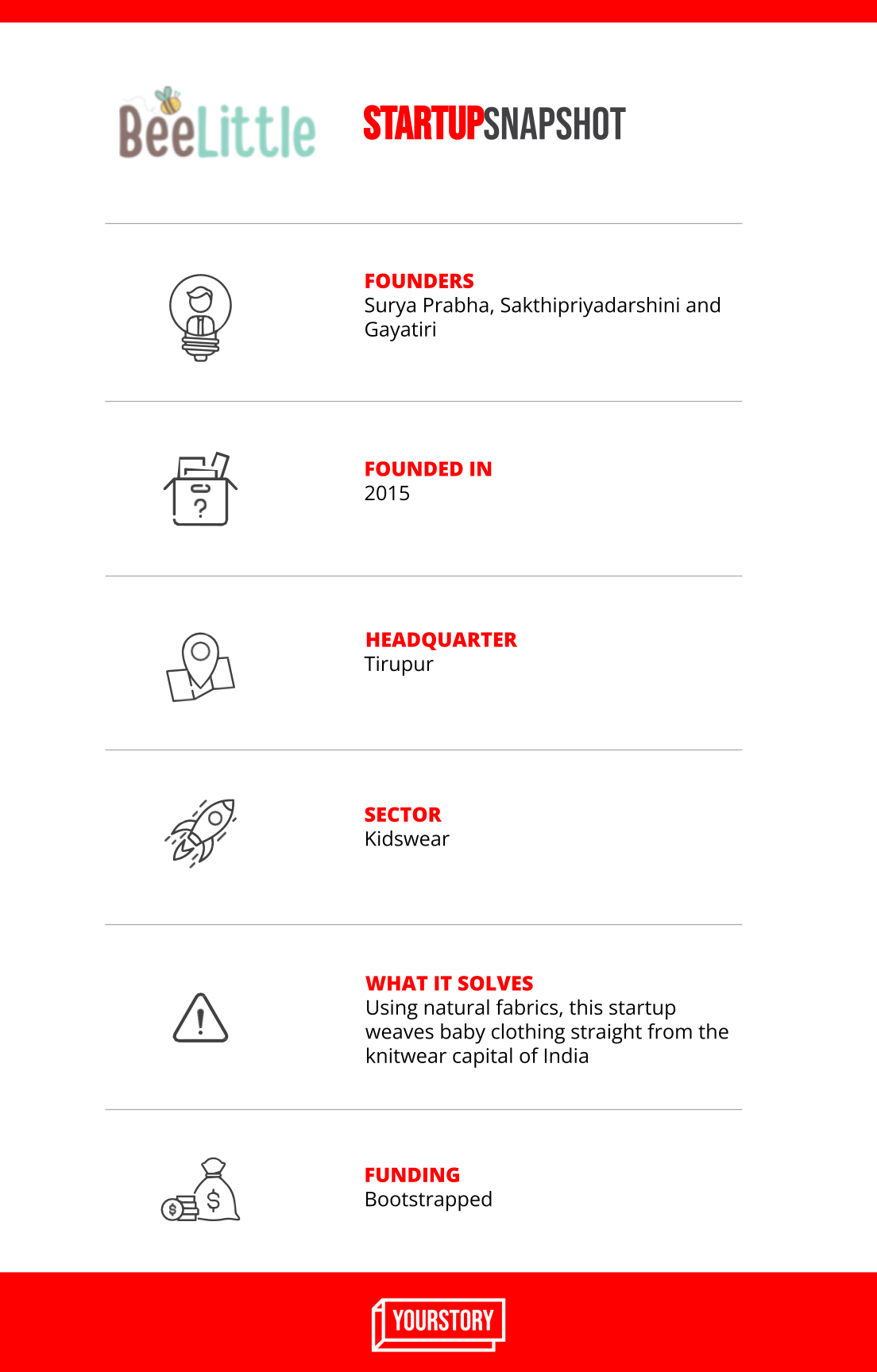After discovering how chemicals, heat and toxins in baby clothes and beds easily get absorbed by a baby’s thin and delicate skin, three college friends - Surya Prabha, Sakthipriyadharshini, and Gayatiri - launched BeeLittle, a toddler garment and accessories startup.
The brand, which sits out of India’s knitwear capital, Tirupur, in Tamil Nadu, manufactures all its products using natural fabrics.
“The main motive of our startup is to give 100 percent sustainable products to the babies. All the fabrics that we use are natural. By natural, we don’t just mean cotton but are specific about organic cotton in a majority of our products, where the process starts from the cultivation itself. We have completely avoided using any polyester or synthetic fabrics in our products,” says Surya Prabha.
“We are particular that every baby’s first products should always come from a natural substance, which not only benefits babies but also Mother Earth,” she adds.

Founded in 2015, the startup claims a majority of its bedding products are made of Kapok silk cotton, a variety of natural cotton stuffing used from ancient days, and not fully utilised in the present day.
According to various reports, being silky soft and dry to the touch, as well as antimoth and antimite the Kapok silk cotton is one of the most sustainable fibres available out there.
“We have a dedicated team to source the best variety of Kapok silk cotton in the best season of every year. We make our products mainly in white base so as to avoid using dark dyes and chemical-based processing. It is softer on the babies too,” Surya informs.
“As majorly an ecommerce business, we use a lot of packing materials every day, which is why we consciously avoid plastic products in packing materials. Our packing covers are made of corn starch or paper, and we use paper boards/cartons as well, although it works out slightly more expensive than the non-sustainable ones,” Surya admits.
BeeLittle has an ecommerce website and two offline stores,one each in Coimbatore and Tirupur.
The startup claims to have over one lakh website visitors every month, around 1,600 SKUs and over 60 products with about 300 variants.
“Nearly 30 percent of the total revenue is through offline stores and 70 percent through ecommerce,” Surya says.
The initial days
Interestingly, when the company first started, it began with the traditional thottil (cradle cloth/jhula), but it has now expanded to 10+ categories over the years.
Surya, Sakthi and Gayatri, all aged 25, started BeeLittle in the name of Vaira Baby Boutique in 2015 with a small-scale set up at home.
“Being young mothers then, we couldn’t find premium quality stuff for our newborns. Products available in the market were not up to the mark and we had to compromise much on it. Although in India we were producing and manufacturing premium cotton/muslin, it was majorly for exports and wasn’t available in the Indian market for our own babies,” Surya says.
“While our grannies advised us to use softer and toxic-free fabrics for babies, there were nearly no options in the market then. Hence, we wanted to bring in traditional wisdom with a contemporary touch that would help other mommies,” she adds.
According to Surya, the initial growth of BeeLittle was due to the massive support from friends, family and early customers who spread the word.
“With zero advertisements or marketing spend in the initial years, we still had people coming all the way to us to shop newborn essentials. Customers re-visiting us for their second babies or gifts, grandparents shopping for all their grandchildren was all a huge motivation.”
All its live products, the founders claim, are 100 percent mom-suggested and mom-approved to best suit little ones. “We aim to continue the same, by providing only what we will give our children, under our brand label,” says Surya.
The startup has a team of 70+ members currently.
Sourcing organic cotton
At Beelittle, the company uses GOTS-certified fabrics. GOTS stands for Global Organic Textile Standard, and is focused on organic production.
“From the very beginning, we have been sourcing our fabrics from the same manufacturer. At every point we make sure that the fabric passes through all the processes. Once in 2018, we placed an order with a different manufacturer but we were not happy with the quality of the fabric,” Surya says.
“Beelittle's muslin fabric is softer than other brands mainly because of the thread count we use which makes sure the fabric durable. Thus, we assure our customers of the best quality organic fabrics that will last till when their infant becomes an adult,” Surya quips.
All BeeLittle's products are made by its own production team with proper quality checks at each stage.
“When we want to buy naturally dyed fabrics from the north, we make sure that there are no middlemen and we communicate directly with the manufacturers and specify our requirements. We end up dealing with around 10-15 manufacturers before opting for one. And our relationship with artisans has always been a unique one. We have mutual understanding between us which makes the whole process easier,” says Surya.
The target audience
About 90-95 percent of BeeLittle’s customers are women between the age 23 to 35 years, buying apparels for their own children or for gifting.
“Once they buy from us, most of them come back for the next size in the later months or buy more after the trial order. We have customers who order more than 10-15 times. Many non-residential Indians who live in various parts of the world order the package to their parents or even directly overseas,” says Surya.
BeeLittle is working on providing essential needs for different climatic conditions of India so that it will be personalised.
“Products like the sleeveless newborn dresses will not suit colder cities like Bengaluru or northern India. Nevertheless, we have now introduced essentials that will serve everyone’s needs specifically,” Surya says.

The way ahead
As per Surya, “for the segment we are targeting, the total market size could be over $0.8 billion dollars. The target is to achieve Rs 150 crore in revenue in the next three years.”
BeeLittle competes with the likes of H&M Kids, FirstCry, Hopscotch, Mothercare India etc.
Started with an investment of Rs 1.5 lakh (Rs 50,000 each), the bootstrapped venture expects a 30 percent growth rate every month.
“This year, we plan to reach about 3x growth, by investing in adding more to the existing categories and new categories. We aim to be the most trusted baby brand in India and in the countries we might step into in the future,” Surya says.
“We also plan on launching more products for moms – pre and postnatal. Also, we are currently exclusive in our direct showrooms, and we aim to continue the same by expanding more offline stores for customer experience pan India,” she adds.
Edited by Anju Narayanan

